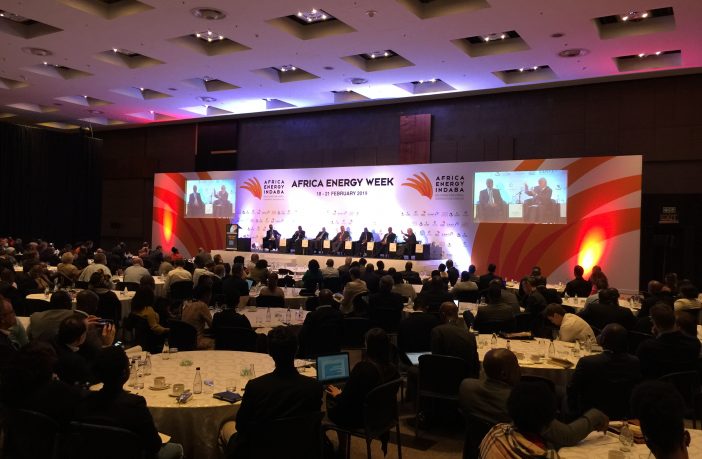South Africa’s Minister of Energy Honourable Jeff Radebe, MP delivered the keynote address this morning at the Africa Energy Indaba held in Sandton, South Africa.
The key takeaways are:
- Coal power is here to stay.
- New generation investment opportunity is in gas power.
- The Inga 3 Hydro project is very much under discussion with the DRC Government.
- Regional integration of the Southern African Power Pool will be fostered.
- We can expect more rooftop PV systems, biogas, waste to energy, and wind turbines to be installed at Municipal level.
- South Africa’s specific focus is more on the hydrogen economy rather than battery storage technology.
The Minister highlighted that approximately 3 million households in South Africa still do not have access to electricity. He said ‘the country’s subsidy-based electrification programme forms a critical pillar of our energy policy and we have to date managed to provide access to approximately 8 million households since the advent of democracy in South Africa.
He added that “electrification through grid connections has been effective in providing lighting and small power, but it is inappropriate for providing thermal energy for cooking and space heating. A significant thermal energy load still needs to be provided for, by providing solutions side by side by with off-grid technologies, particularly in those areas that are too remote to build grid-based infrastructure”.
The Minister also explained that coal power is here to stay despite the environmental concerns. “The energy sector alone, contributes close to 80% towards total emissions of which 50% are from electricity generation and liquid fuel production alone. While a paradigm shift is required for these emission reduction targets to be realized, as government we cannot do this in a manner that is unjust relative to those that would be negatively affected by these adjustments. Our vast coal deposits cannot be sterilized simply because we cannot exploit technological innovations to exploit them. The timing of the transition to a low carbon economy must be in a manner that is not insensitive to the potential impacts on jobs and local economies. Carbon capture and storage, underground coal gasification, coal to liquids and other clean coal technologies are critical considerations that will enable us to continue using our coal resources in an environmentally responsible way”.
The Minister stressed that the South African power sector is very well positioned to leverage investment particularly in new generation from gas. “With the increasing availability of gas in Southern Africa we will be able to expand electricity generation through the use of gas. There is enormous potential and opportunity in this respect and last week we excitedly learned about the Brulpadda gas resource discovery in the Outeniqua Basin of South Africa. The SADC has also recognized the strategic need for a regional Gas Master Plan, given the recent gas discoveries in parts of SADC. Mozambique and Tanzania gas resources in particular, are well positioned for cross-boundary development of gas pipeline infrastructure. It is important that gas demand in the region is serviced from regional gas resources, so as to increase the opportunity for intra-African trade and economic collaboration. The planned gas pipeline from Rovuma Basin in Mozambique through South Africa and possibly beyond, are supported”.
He added that the interconnection with our neighbouring countries also gives us an opportunity not only to improve our energy mix by harnessing the hydro-potential in these countries, but is also bodes well for economic development in the Southern African Development Community (SADC) as a whole. “The department is leading discussions with our regional neighbours on hydroelectricity, notably from the Democratic Republic of the Congo (DRC) in terms of the Treaty on the Grand Inga Hydropower Project”, he announced.
“Municipalities are also keen to generate their own power albeit on a small scale. As wholesale electricity tariffs rise, or as we fail to provide electricity for the residential sector, we can expect more rooftop PV systems, biogas, waste to energy, and wind turbines to be installed at municipal level”
“South Africa’s specific focus is more on the hydrogen economy rather than battery storage technology, and the progress achieved through this effort is epitomized by the hydrogen initiative (or Hy-Sa) based at the University of the Western Cape. This is a collaborative effort between South African and international research agencies, industry and government. Amongst the Hy-Sa programmes is the development of hydrogen and Fuel Cell systems, prototype development, technology validation and system integration. We see the development of very sophisticated energy technologies, like hydrogen economy, as potential game changers in the current ecosystem for access to energy and for African development”.
The minister concluded “The provision of a reliable, efficient and continuous supply of electricity is the missing link that is essential for African economies to develop and flourish. We have to be honest and acknowledge that the challenges with electricity supply have had a stunting effect on our economies and we have therefore not fully exploited the potential for job creation. Our communities are also demanding adequate service delivery including the supply of affordable electricity. We are duty-bound as government leaders”.
Author: Bryan Groenendaal















